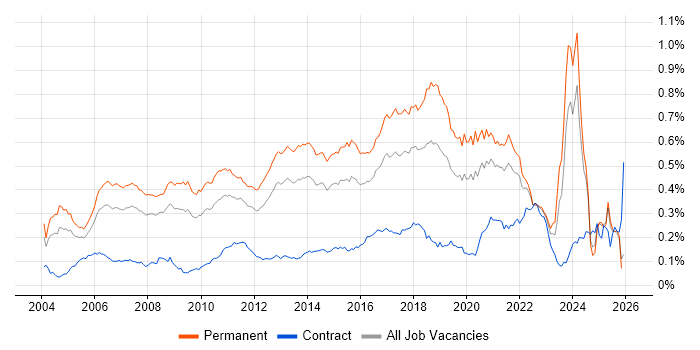Java Software Engineer
UK > UK excluding London
The median Java Software Engineer salary in the UK excluding London is £70,000 per year, according to job vacancies posted during the 6 months leading to 20 February 2026.
The table below compares current salary benchmarking and summary statistics with the previous two years.
|
|
6 months to
20 Feb 2026 |
Same period 2025 |
Same period 2024 |
| Rank |
477 |
489 |
278 |
| Rank change year-on-year |
+12 |
-211 |
+283 |
| Permanent jobs requiring a Java Software Engineer |
56 |
46 |
484 |
| As % of all permanent jobs in the UK excluding London |
0.11% |
0.14% |
0.96% |
| As % of the Job Titles category |
0.13% |
0.16% |
1.01% |
| Number of salaries quoted |
49 |
16 |
121 |
| 10th Percentile |
£48,289 |
£36,875 |
£41,500 |
| 25th Percentile |
£55,000 |
£47,188 |
£48,750 |
| Median annual salary (50th Percentile) |
£70,000 |
£65,000 |
£57,500 |
| Median % change year-on-year |
+7.69% |
+13.04% |
+4.55% |
| 75th Percentile |
£85,000 |
£80,000 |
£77,500 |
| 90th Percentile |
£90,000 |
£95,000 |
£91,250 |
| UK median annual salary |
£82,500 |
£107,500 |
£70,000 |
| % change year-on-year |
-23.26% |
+53.57% |
-17.65% |
For comparison with the information above, the following table provides summary statistics for all permanent IT job vacancies in the UK excluding London. Most job vacancies include a discernible job title that can be normalized. As such, the figures in the second row provide an indication of the number of permanent jobs in our overall sample.
| Permanent vacancies in the UK excluding London with a recognized job title |
44,585 |
29,316 |
47,841 |
| % of permanent jobs with a recognized job title |
91.27% |
91.43% |
94.95% |
| Number of salaries quoted |
27,998 |
14,451 |
37,066 |
| 10th Percentile |
£28,250 |
£31,250 |
£26,500 |
| 25th Percentile |
£35,000 |
£41,110 |
£35,000 |
| Median annual salary (50th Percentile) |
£50,000 |
£55,000 |
£50,000 |
| Median % change year-on-year |
-9.09% |
+10.00% |
-4.76% |
| 75th Percentile |
£65,000 |
£68,750 |
£65,000 |
| 90th Percentile |
£80,000 |
£82,500 |
£77,500 |
| UK median annual salary |
£55,000 |
£60,000 |
£55,000 |
| % change year-on-year |
-8.33% |
+9.09% |
-8.33% |
Java Software Engineer
Job Vacancy Trend in the UK excluding London
Historical trend showing the proportion of permanent IT job postings featuring 'Java Software Engineer' in the job title relative to all permanent IT jobs advertised in the UK excluding London.
Java Software Engineer
Salary Trend in the UK excluding London
Salary distribution trend for Java Software Engineer job vacancies in the UK excluding London.
Java Software Engineer
Salary Histogram in the UK excluding London
Salary distribution for jobs citing Java Software Engineer in the UK excluding London over the 6 months to 20 February 2026.
Java Software Engineer
Job Locations in the UK excluding London
The table below looks at the demand and provides a guide to the median salaries quoted in IT jobs citing Java Software Engineer within the UK excluding London region over the 6 months to 20 February 2026. The 'Rank Change' column provides an indication of the change in demand within each location based on the same 6 month period last year.
| Location |
Rank Change
on Same Period
Last Year |
Matching
Permanent
IT Job Ads |
Median Salary
Past 6 Months |
Median Salary
% Change
on Same Period
Last Year |
Live
Jobs |
| North of England |
+3 |
30 |
£55,000 |
-15.38% |
2 |
| North West |
+4 |
16 |
£73,750 |
+13.46% |
1 |
| Yorkshire |
-27 |
9 |
£55,000 |
+57.14% |
1 |
| South East |
-9 |
8 |
£90,000 |
+18.03% |
9 |
| South West |
-21 |
8 |
£60,000 |
+4.35% |
8 |
| Scotland |
-3 |
6 |
£92,500 |
- |
5 |
| North East |
-8 |
5 |
£55,000 |
-31.25% |
|
| Midlands |
0 |
2 |
£60,000 |
+33.33% |
5 |
| East of England |
- |
2 |
£77,500 |
- |
|
| East Midlands |
-15 |
1 |
£40,000 |
-11.11% |
2 |
| West Midlands |
- |
1 |
£80,000 |
- |
3 |
Java Software Engineer
UK |
Java Software Engineer Skill Set
Top 30 Co-Occurring Skills & Capabilities in the UK excluding London
For the 6 months to 20 February 2026, Java Software Engineer job roles required the following skills and capabilities in order of popularity.
The figures indicate the absolute number of co-occurrences and as a proportion of all permanent job ads across the UK excluding London region featuring Java Software Engineer in the job title.
Java Software Engineer Skill Set
Co-Occurring Skills & Capabilities in the UK excluding London by Category
The following tables expand on the one above by listing co-occurrences grouped by category. They cover the same employment type, locality and period, with up to 20 co-occurrences shown in each category:


